
How do you stay close to your sister when she’s located 4,000+ mi. across the Atlantic?
When your sister is a city, there’s only one real way to stay close – and that’s to get on an airplane and visit in person.
That’s just what folks who call the City of Reading home and the City of Reutlingen in the southwestern German state of Baden-Württemberg home have been doing for the better part of the past three decades. For 25 years, officials in both cities have formally declared and strengthened their sisterhood — or twinning.
Reading hosted a delegation from Reutlingen in March as a part of our city’s 275th anniversary celebration. (A former and future mayor from Reading, United Kingdom, our other sister — sometimes referred to as our “mother city” — were also on hand.)
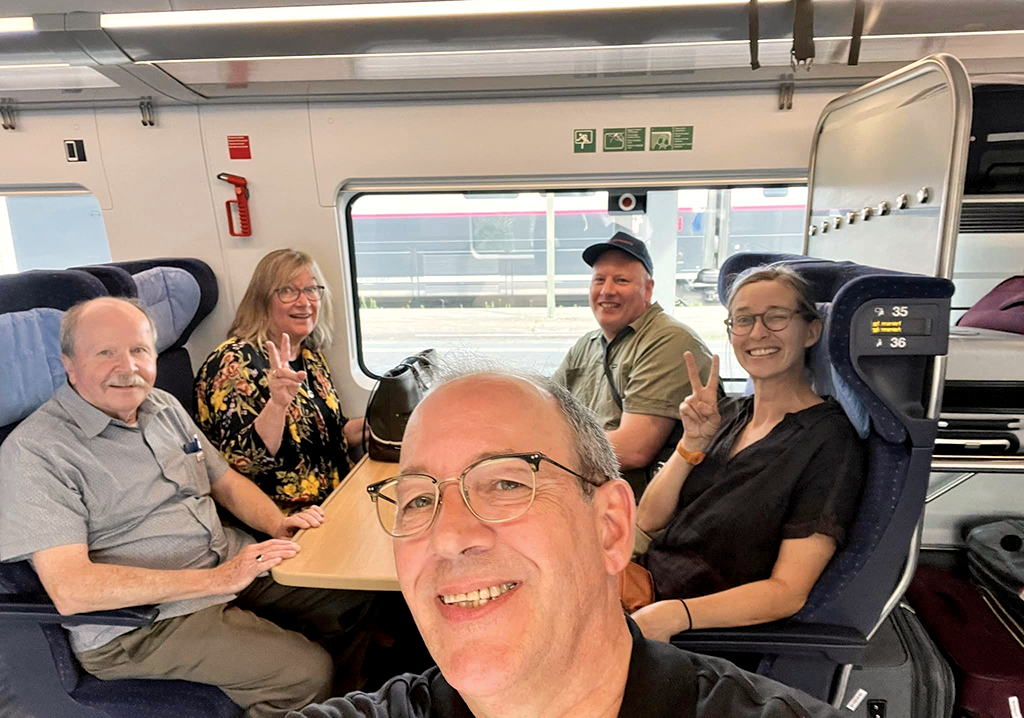
In July, as one of many such exchanges since at least 1989, a five-member delegation including this article’s author, who serves as City Council president, City Councilor O. Chris Miller, Reading Area Community College Foundation and Reading Symphony Orchestra board member William Bender, the city’s 275th anniversary coordinator Laura Reppert, and Bradley Smith, archivist and assistant director of the Berks History Center, made the journey. The group found Reutlingen, its city, academic, business and cultural officials and its citizens at large very warm and welcoming.

On Our Way
Our group started its journey embarking from Newark International to Frankfurt am Main Airport via Icelandair. Shopping around, we found round-trip airfare including travel insurance for $1,268. Icelandair required flying into the Reykjavik International Airport and changing planes, hence the modest fare. Bonuses here: flying past the tip of Greenland approaching Iceland, observing an erupting volcano as well as the aerial view of the island nation’s stunning topography, and stepping into Iceland’s cool, fresh air after the heat and humidity of mid-July in the U.S.
Frankfurt International Airport, like Newark, is huge. Multilingual directional signage is efficient, and the terminal(s) are very attractive thanks to recent updates.
From the airport, transport to the main Frankfurt rail station is pretty simple. And from there, all of Germany and beyond are affordable fares away. The trip south to Reutlingen takes about three hours.
Four of us stopped in Esslingen that first night. Located about 11 miles from Stuttgart and maybe 17 from Reutlingen, it was a welcome respite after the long night/day journey. Located on the Neckar River in the Stuttgart region of Baden-Wurttemberg, it’s a smaller city that boasts a wealth of medieval half-timbered buildings in the town center that escaped significant World War II bombing.
By staying in a modest hotel on Plochingerstrasse close to the rail station, those ancient buildings, a mix of retail and residential, were within easy walking distance. Even on a mid-week night, the Marketplatz was lively with diners like us savoring the beers, wine and German food specialties.
With limited time the next morning, we got some good looks at nearby parks, enjoyed a lovely bakery and coffee, and tucked in another architecturally stunning walk.
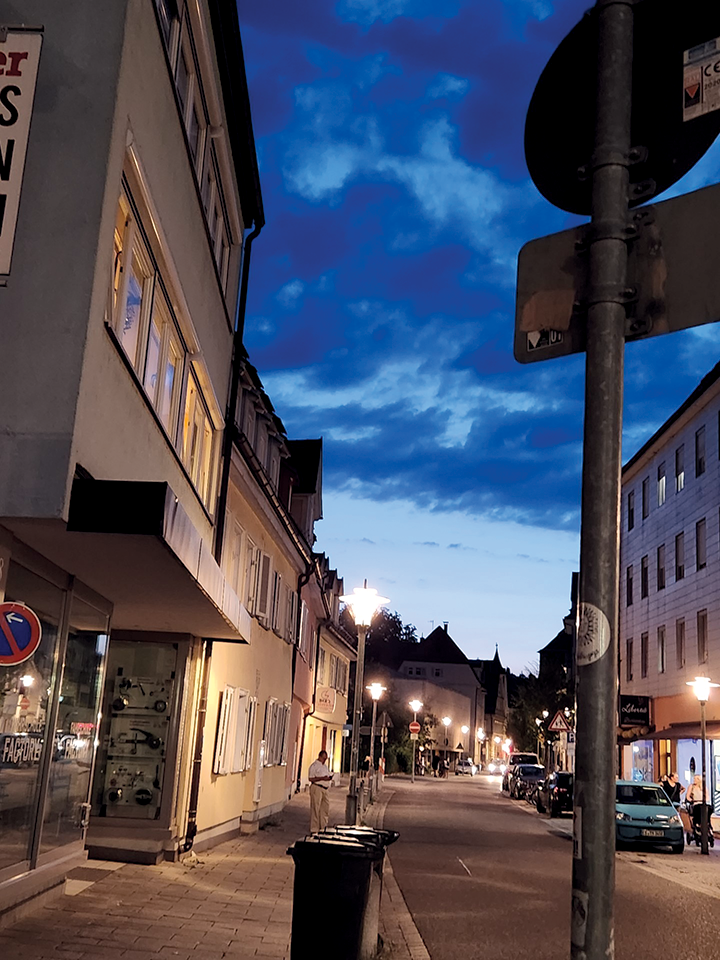
Return to Reutlingen
A 30-plus-minute train ride took us to Reutlingen, and then a quick cab ride from the rail station to the City Hotel Fortuna, a very no-frills but modern facility within walking distance of the old city and nature trails.
Greeted by our friend Petra Bannasch of the Reutlingen Cultural Office and Ulrich Track, sister city coordinator, we enjoyed a refreshing outdoor lunch with Lord Mayor Thomas Keck and others at the Hotel Restaurant Achalm. The charming eatery is part of the modern, elegant hotel just below the summit topped by the 1838 tower of the Achalm sitting on the ruins of an 11th-Century castle. The summit provides incredible views towards Reutlingen and the whole of the Swabian Alb. (The Berks equivalent is viewing Reading and the western expanse of the county from the Pagoda/William Penn Fire Tower/Skyline area of Mount Penn.)
Next was a guided tour of Reutlingen’s charming old city center led by Rainer Krimmel. He explained the site of the old city walls still standing after the 1726 fire that destroyed much of the town. Then, on to the town center with the stunning Marienkirche constructed between 1247 and 1343. Damaged in that fire, it was reconstructed and is a “national cultural monument.”
The cobblestoned market square, with its 1570 fountain featuring Maximilian II, Holy Roman Emperor (remember Reutlingen sits at the northern tip of that ancient empire), the Zunftbrunnen, a newer fountain which honors the economic and political groups of the guilds to the 1500s, and the Eistrum, which is one of a few remaining towers of the original walls later used as a municipal ice house, were all highlighted, as was the marker noting the birthplace of Friedrich List, the 18th century economist, entrepreneur and journalist who is the historical link between Reading and Reutlingen.
Just undergoing restoration is the all-important Tubinger Tor, a 13th century half-timbered gate tower, the sole preserved gate of the original town wall.
One attraction for the record books is the Spreuerhof-Strasse. Guinness lists it as the narrowest street in the world at 31 centimeters at its narrowest. Try squeezing through it — and make certain to breathe in!
The local history museum was a treasure, and the nearby modern city library is a hub of activity for young and old.
An open-air supper in the city centre, again featuring Swabian cuisine, completed our first day.
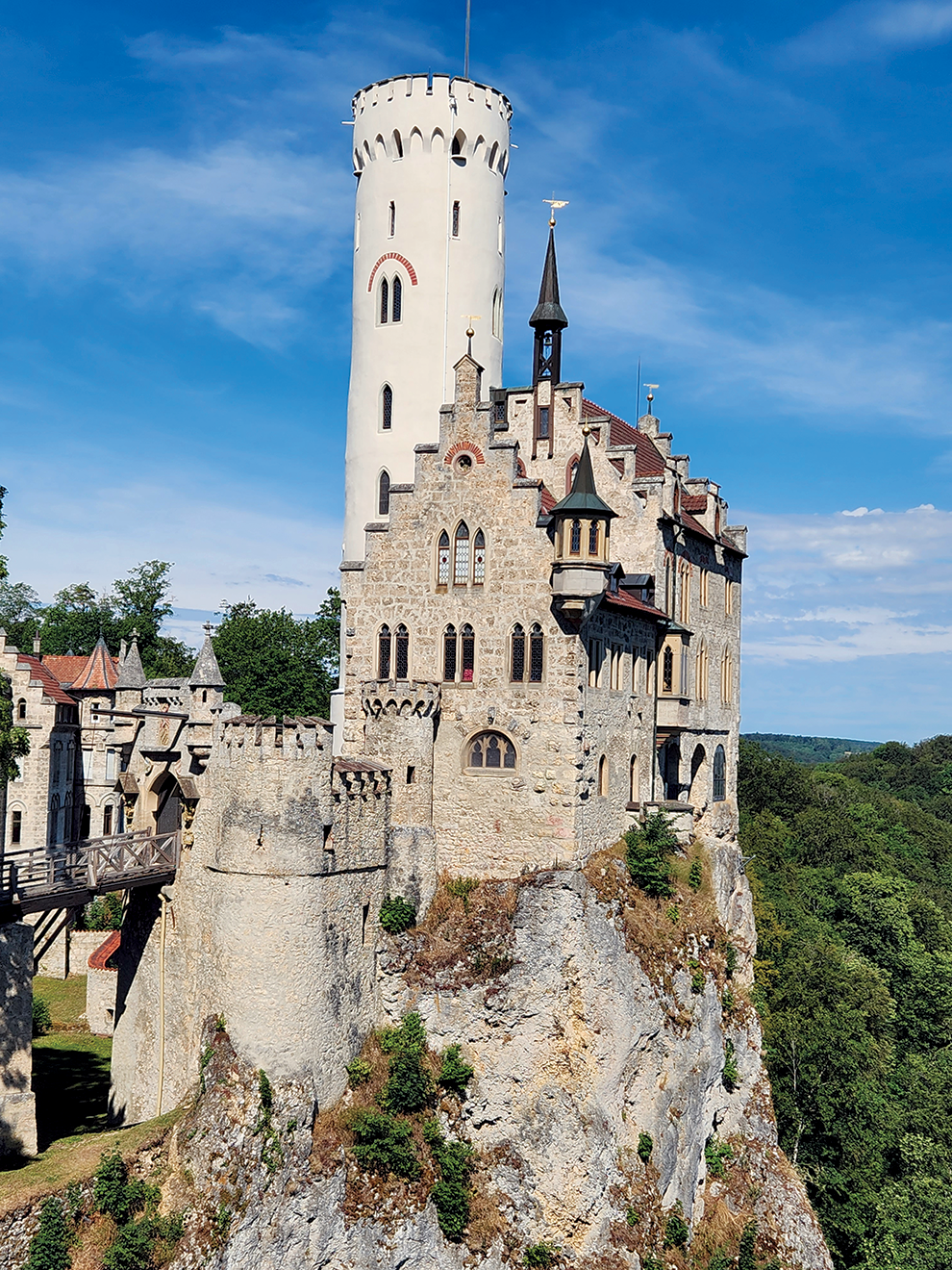
Touring a Fairy Tale & a Formal Gathering
Saturday started with a foray to Lichtenstein Castle. It’s a 20-minute drive south through a winding country road and charming villages.
This fairy-tale castle perched on a steep cliff near Honau overlooking the Echaz Valley is sometimes referred to as the Neuschwanstein of Wurttemberg. The castle, first mentioned in the early 1200s, was destroyed and rebuilt over the centuries; the current neo-Gothic version dates to 1842. The name translates to “shining stone.”
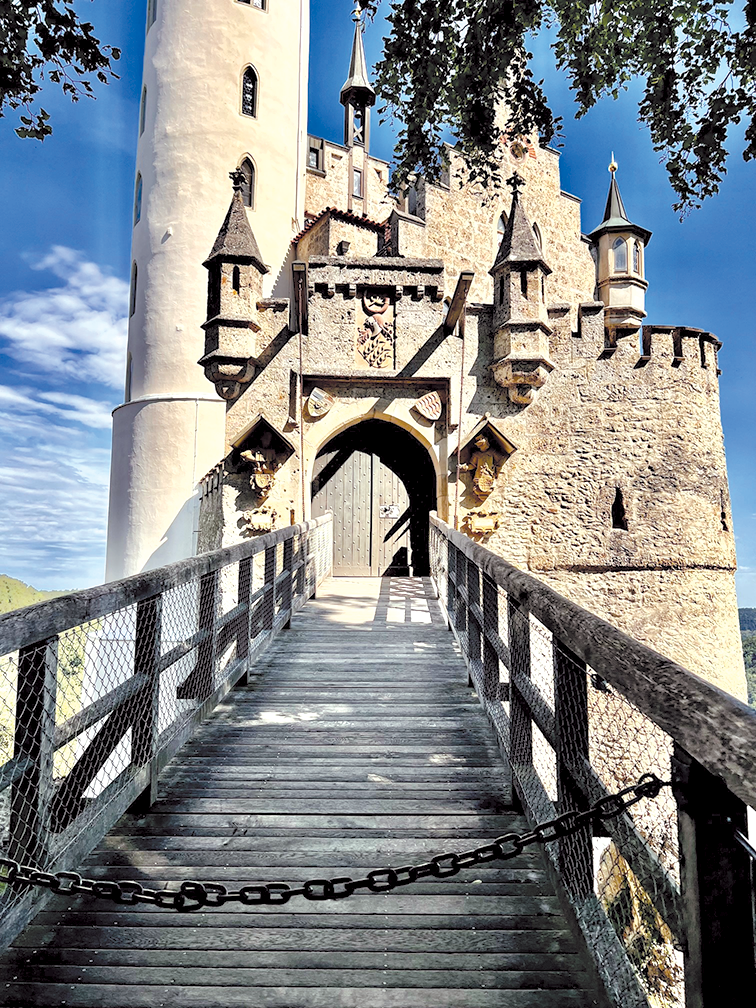
A guided tour of its fascinating and ornate interior takes about 30 minutes. Visitors can glimpse bullet holes remaining from World War II. The grounds and 360-degree views are expansive and stunning, as is the fact it is still privately owned by the Urach family with family photos proudly displayed.
On the return to Reutlingen, we stopped at a trout farm and its accompanying Forellen Rossle Restaurant. This one was located near the headwaters of the Echaz and along footpaths used as far back as the Romans.
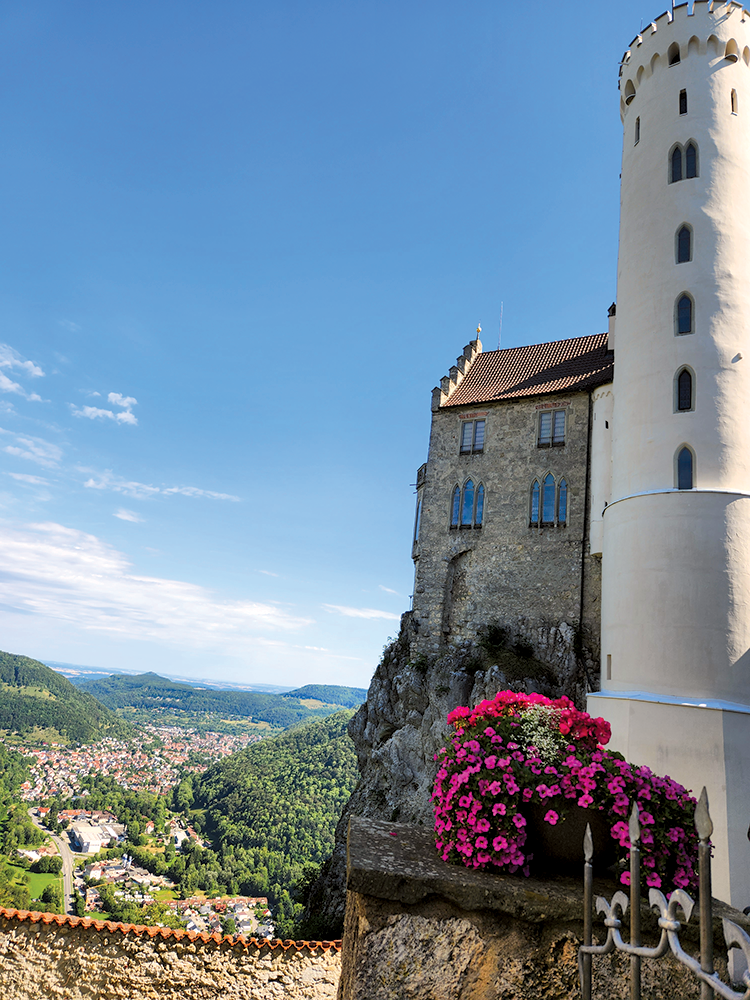
It's difficult to describe just how delicious freshly prepared trout can be with a bit of a horseradish sauce accompaniment and Swabian side dishes like Maultaschen, Käsepätzle, Linsen and Spätzle and the fabulous potato salad.
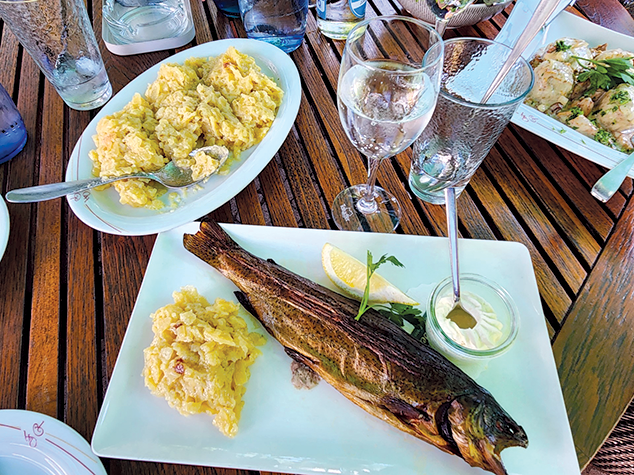
By late afternoon, we were in Reutlingen City Hall for the official 25 Jahre Stadtepartnerschaft mit Reading. The Reutlingen Jazz Duo, Clemens Wittel and Charly Heim, whose planned visit to Reading in 2020 fell victim to the pandemic, treated the packed auditorium to the sounds of Count Basie, Duke Ellington and George Gershwin. Oberburgermeister Keck and myself delivered speeches highlighting the many facets of our partnership. Councilor Miller presented proclamations from the County of Berks and the City of Reading.
As Reading representatives, we were presented with a special street sign noting the partnership — and the 4,000 miles — between our cities. The sign will be sited in a public space here in Reading. The entire delegation, along with Reutlingen officials, also signed the city’s “Golden Book,” which serves as historical documentation for special events.
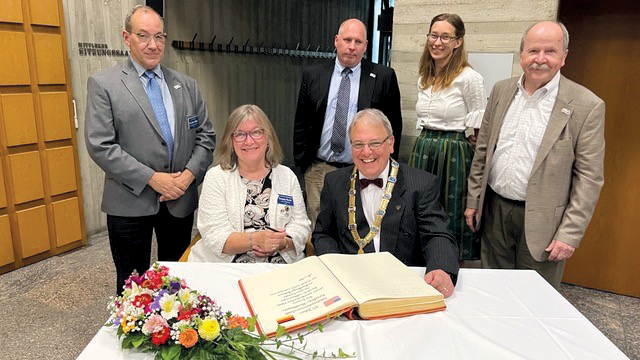
Among those attending was the estimable Dr. Eugen Wendler, the foremost expert on the life of Friedrich List, a son of Reutlingen and a true Renaissance man who from 1825 to 1832 secured the link between our cities. List, in addition to his huge European accomplishments, edited Der Readinger Adler (German language precursor to the Reading Eagle) and was a founder to the precursor of the Reading Railroad.
It was our pleasure to present Dr. Wendler, who has visited Reading and Berks often and authored several important books and papers on List, a commemorative plate of our beloved Pagoda.
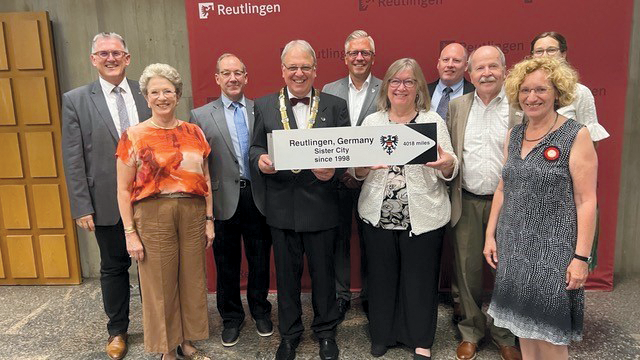
Celebrating Democracy & Independence
Following the ceremony, it was on to the open-air preview of Sunday’s Schwortag. This “festival of democratic cheerfulness,” revived in 2005 by former Oberburgermeister Barbara Bosch, brings together thousands of townsfolk to commemorate democratic order, independence and self-determination.
Full observation occurred Sunday, starting with a service at the Marienkirche. From there, a parade that wound through the heart of the town — in which the Reading delegation was invited to participate — took everyone to the outdoor celebration at a grove fronting the Friedrich-List-Gymnasium (school).
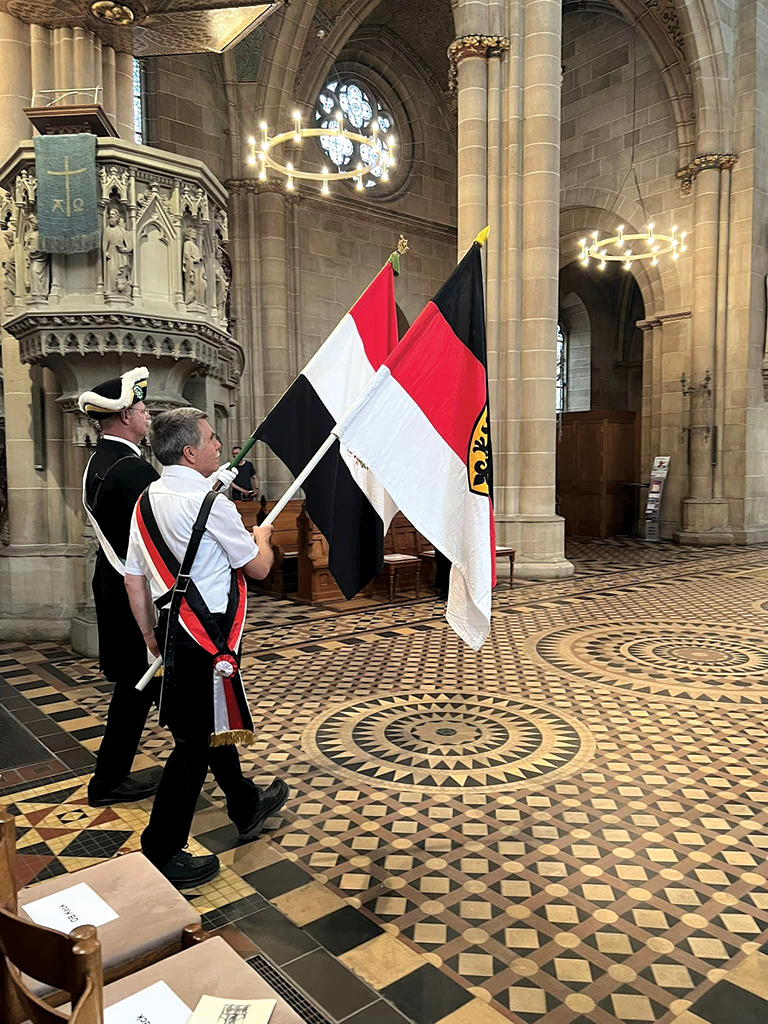
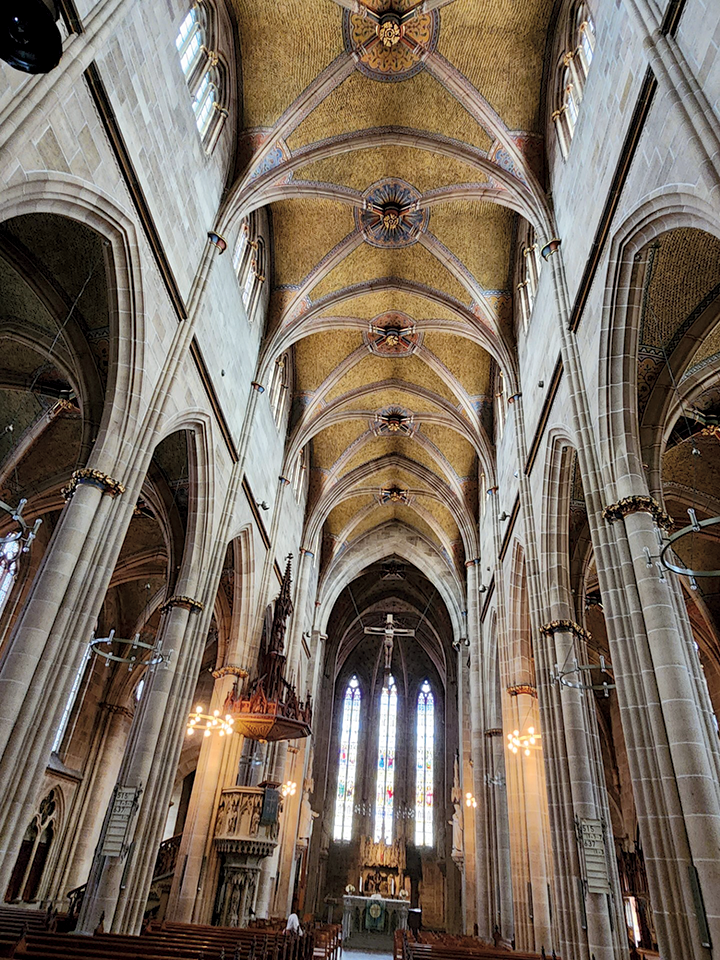
Keck opened the event with a lengthy speech filled with historical context — and some warnings about threats to democracy in Germany and elsewhere. He then took the annual ceremonial oath. After, musical presentations from youth groups to traditional Liederkranz sounds to American pop abounded as well as a fascinating flag waving display.
In the afternoon, it was on to the incredibly beautiful neighboring town of Tubingen and a delightful punting boat excursion on the Neckar River. The views of this flower-filled, architecturally breathtaking city are likely the finest anywhere in Germany. The extensive use of the riverfront throughout the city and the respect its natural environs are given are inspirations.
Our last day was one for business and academic appointments. We began with a visit to the Johannes-Kepler Gymnasium (high school) for a tour and discussion with some amazing students. For anyone who’s traveled to Europe recently, you’ll have noted the proliferation of American professional sports apparel. A couple of the male students wore Los Angeles Lakers T-shirts. Reading’s own basketball star Lonnie Walker was a member of the team through the 2023 playoffs and that he had one particular outstanding game. When we noted that Reading is Lonnie’s hometown and that he was a state star while at Reading High, the boys were full of excited comments and questions.
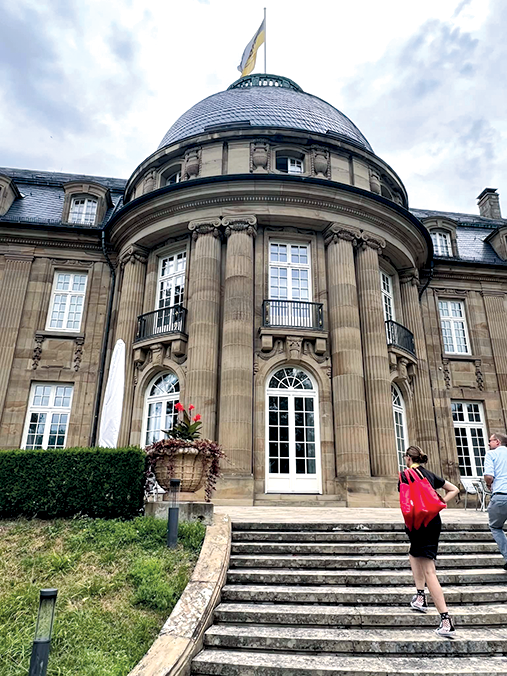
So Long, Farewell
We bade farewell to Mayor Keck at lunch at Restaurant Karlshohe in nearby Betzingen, a hometown he shares with Petra Bannasch. Then it was on to the Innovation Center Innoport, a challenged area of Reutlingen near railroad tracks that is being redeveloped. One of our tour guides was a very gracious robot!
The day and visit wrapped with an outdoor farewell dinner with Reutlingen officials at the Alfredo/Alte Muhle perched on the Echaz riverbank and nature trail. Its Italian chef and his creations are legend in the city.
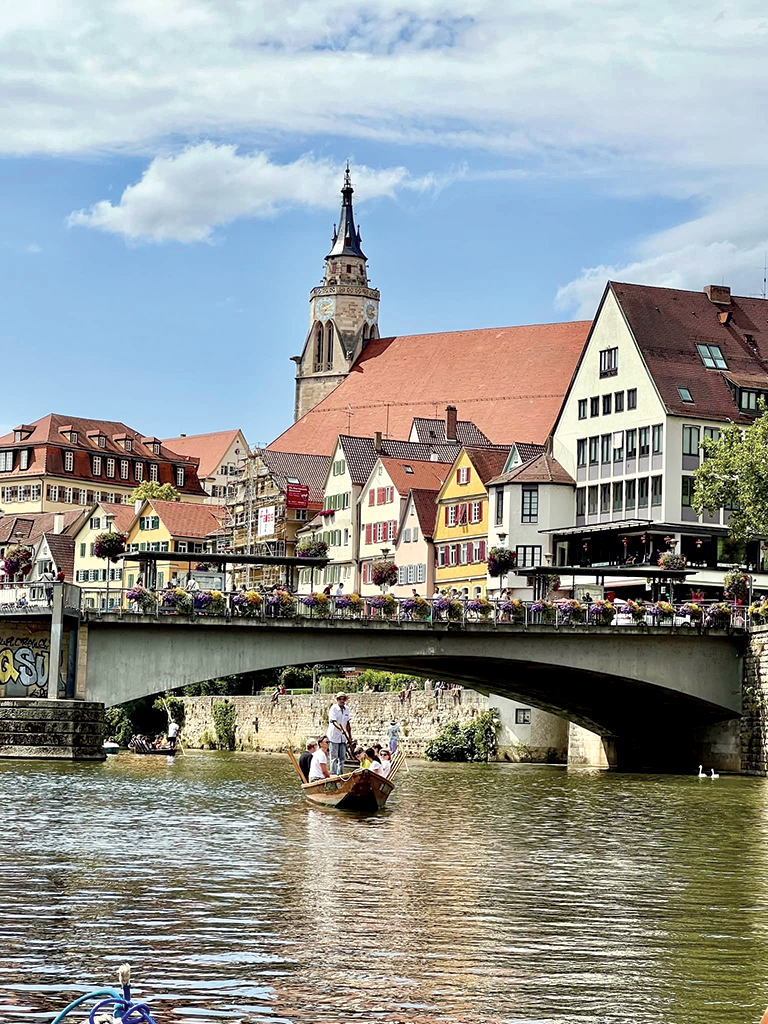
Our last day was split between Stuttgart and Frankfurt. In Stuttgart, we were the guests of former Lord Mayor Bosch, now Honorary State Councillor for Civil Society and Citizen Participation in Baden-Wurttemberg (equivalent to a Pennsylvania cabinet position but without compensation).
She secured a private tour of the Villa Reitzenstein, also known as Clay House, constructed by a Stuttgart merchant in the early 1920s and used ultimately both by generals of the Wehrmacht and after 1945 by American officers. It was returned to Germany in 2012 and now houses meeting rooms and State Ministry of Baden Wurttemberg offices, including Bosch’s. Nestled among extensive terraced gardens, it faces the Stuttgart basin and offers a fantastic view of the city from its front terrace.
Another special treat was catching up with an old friend, Reading’s former deputy city clerk Chris Kanezo, a full-time Stuttgart resident now working for the US government. Incredibly, he lives just a block or so from the mansion and was excited to finally enter and tour its storied grounds and interior.
Then, on by rail to Frankfurt and taking residence in a modest hotel near the huge rail station.
The next morning, luggage in tow, we trekked to the train station and caught a quick ride to the airport.
Flights departed on time, including the connecting ones, and we and our luggage arrived in Newark about 7 that same night filled with much joy about our days in Reutlingen.
Editor’s note:
Council President Donna Reed and Councilor O. Chris Miller paid their own flights and expenses on this official trip. No City of Reading funds were accessed or used.
















